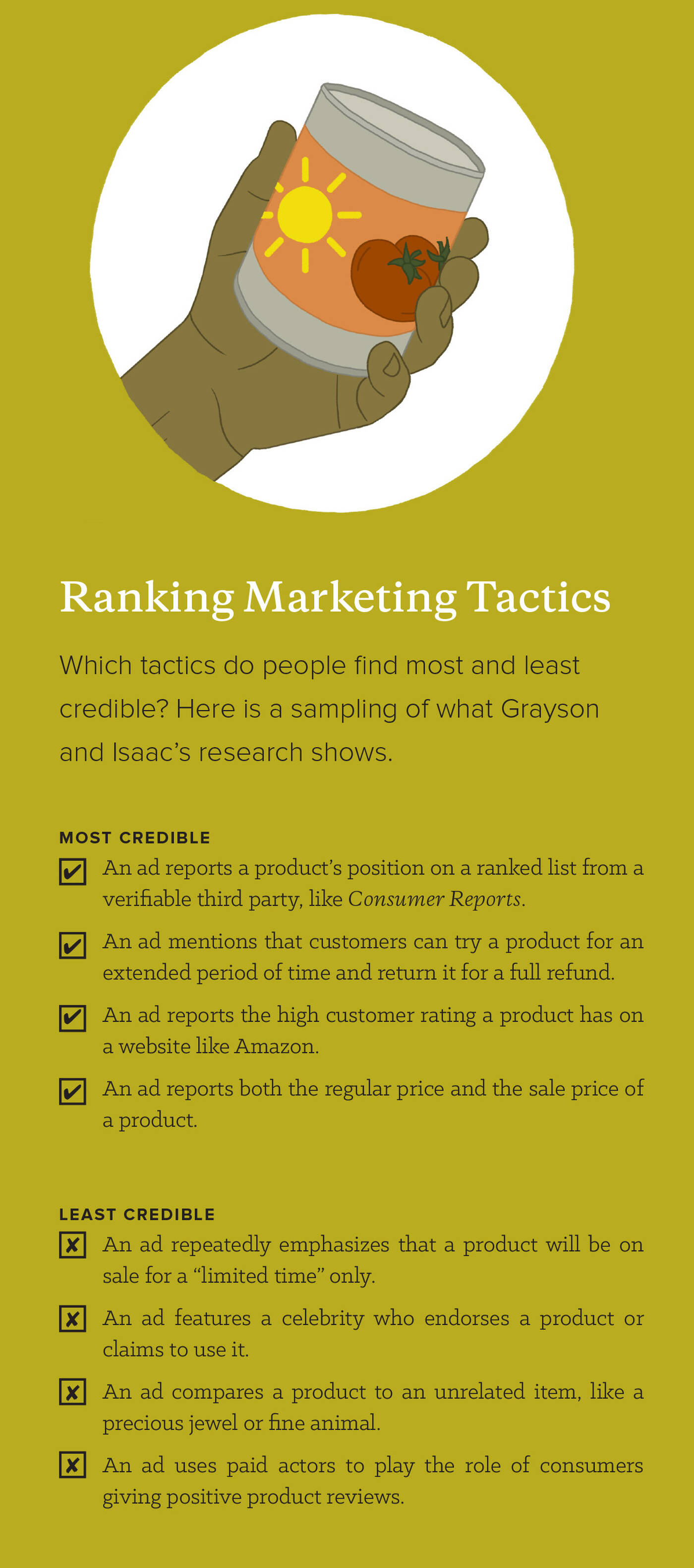Marketing Apr 13, 2017
How to Make Ads That Even Savvy Customers Trust
People are more skeptical than ever about marketing—but that doesn’t mean they distrust all of it.

Lisa Röper
Your company is debating a marketing strategy for an upcoming sale. Should the ad campaign stress that your products are routinely given high ratings by Consumer Reports or do you want to remind customers that the sale price will only be offered for a limited time?
If combating skepticism is a goal, touting your Consumer Reports rating might be the way to go. New research from a Kellogg School marketing professor and a colleague shows that customers find some marketing tactics inherently manipulative, but others—like third-party rankings—legitimate and informative.
This finding is more nuanced than previous research, which has generally espoused a more narrow marketing industry mantra: customers implicitly distrust all advertising strategies, because they know they are being persuaded to buy something.
“What we have done is challenge the stereotype of marketing as being perceived as wholly deceptive,” says Kent Grayson, an associate professor of marketing.

Are Ads Always Manipulative?
So which marketing tactics do people tend to trust?
Grayson and his colleague Mathew Isaac of Seattle University (a former Kellogg PhD student) began their research by asking more than 400 consumers to complete one of two online surveys about 20 different advertising and sales tactics.
In one survey, participants scored these tactics for 12 traits, six of which were positive and six negative. In the second survey, people were asked to pick one word out of a list of 12 that they felt best described a given tactic. The results from both surveys showed that participants considered some tactics positive (scoring them high on words like “helpful”), while they considered other tactics negative (scoring them high on words like “dishonest”). Overall, says Grayson, “we found there are quite a few tactics that consumers trust.”
At the top of the list for trustworthiness were tactics like pledging to match competitors’ prices or allowing customers to return a product for a full refund if they don’t like it. At the bottom of the scale were tactics like comparing a product to an unrelated item, like a precious jewel, or stressing that a product will be on sale for a “limited time” only.
“If you asked these same consumers whether they trust marketers,
they might say no,” Grayson adds. “But it is revealing that when it
comes to specific tactics, consumers do trust some more than others.”
Keeping an Open Mind about Persuasion Tactics
The belief that consumers are innately skeptical of marketing is shared by both business leaders and academics. It is not uncommon for the business press to publish surveys showing that consumers in general (and millennials in particular) distrust companies and disbelieve advertising. In academia, researchers have commonly assumed that consumers have “persuasion knowledge”—that is, a savvy understanding of how marketing can be manipulative and a tendency to therefore be defensive whenever they are the target of a sales pitch.
“Consumers do not just hold beliefs about when and why marketers deceive us. They also form beliefs and ideas about when and why to trust an ad.”
But Grayson and Isaac thought that this common assumption about
consumers was incomplete, and that persuasion knowledge might also
include an understanding of how marketing can be helpful and
informative.
They conducted a series of experiments to test this. But, importantly, they prefaced these experiments differently than previous researchers had done. Rather than reminding participants that they should be skeptical because marketing tactics are designed to manipulate them into making a purchase, Grayson and Isaac instead encouraged participants to keep an open mind about motives.
In one experiment, the researchers showed online participants an ad for headphones. Before viewing, one group was told to consider why a company might have used a particular advertising approach, while a control group was told to simply think about what they look for in a pair of headphones.
When the ads used a tactic that had been deemed credible in the initial experiments, such as quoting positive reviews from industry experts, participants who were told to think about the advertising tactic were more likely to think favorably of the ad than those who were simply thinking about headphones. But this was not the case for ads that had been deemed manipulative, such as using paid actors to give positive testimonials.
“Our experiments highlight the fact that consumers do not just hold beliefs about when and why marketers deceive us,” Grayson says. “They also form beliefs and ideas about when and why to trust an ad.”
Assume Less Skepticism
Some tactics, such as price matching, may be considered more credible because they are easier to verify than other marketing ploys, such as whether a celebrity actually uses a particular brand of coffee, Grayson says.
Simply assuming that every buyer is skeptical could lead to wasted time and money. “If you approach marketing with the presumption that people perceive all your actions with suspicion, you may end up taking an overly careful approach to avoid triggering an effect that is not there,” he says.
Instead, advertising professionals could focus on identifying aspects of their brand or marketing campaigns that buyers find informative and helpful.
“Marketers may benefit from having a more sophisticated understanding of the extent to which their target consumer is cynical about marketing,” he says.


